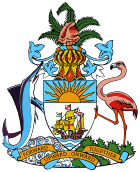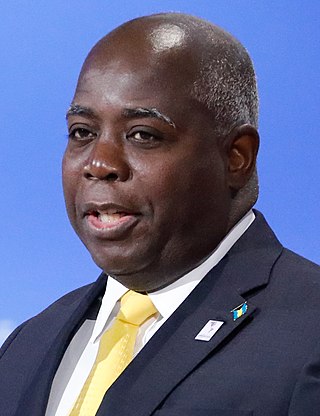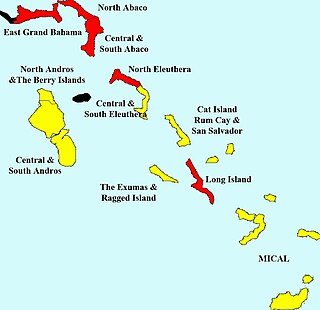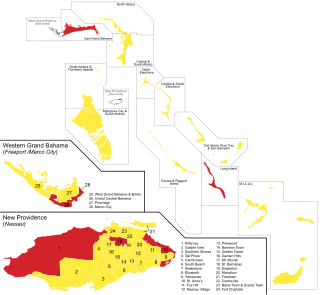 |
|---|
General elections were held in the Bahamas between 8 and 20 June 1956. Although the Progressive Liberal Party emerged as the largest party, winning six seats, the majority of seats were won by independents.
 |
|---|
General elections were held in the Bahamas between 8 and 20 June 1956. Although the Progressive Liberal Party emerged as the largest party, winning six seats, the majority of seats were won by independents.
| Party | Votes | % | Seats | |
|---|---|---|---|---|
| Progressive Liberal Party | 7,152 | 32.60 | 6 | |
| Bahama Democrat Labour Party | 1,417 | 6.46 | 1 | |
| Independents | 13,372 | 60.95 | 22 | |
| Total | 21,941 | 100.00 | 29 | |
| Source: Hughes [1] | ||||

The Bahamas, officially the Commonwealth of The Bahamas, is an island country within the Lucayan Archipelago of the West Indies in the North Atlantic. It takes up 97% of the Lucayan Archipelago's land area and is home to 88% of the archipelago's population. The archipelagic state consists of more than 3,000 islands, cays, and islets in the Atlantic Ocean, and is located north of Cuba and northwest of the island of Hispaniola and the Turks and Caicos Islands, southeast of the U.S. state of Florida, and east of the Florida Keys. The capital is Nassau on the island of New Providence. The Royal Bahamas Defence Force describes The Bahamas' territory as encompassing 470,000 km2 (180,000 sq mi) of ocean space.

The earliest arrival of people in the islands now known as The Bahamas was in the first millennium AD. The first inhabitants of the islands were the Lucayans, an Arawakan language-speaking Taino people, who arrived between about 500 and 800 AD from other islands of the Caribbean.

The Bahamas is a parliamentary constitutional monarchy headed by King Charles III in his role as King of the Bahamas. The politics of The Bahamas takes place within a framework of parliamentary democracy, with a Prime Minister as the Head of Government. The Bahamas is an Independent Country and a member of the Commonwealth of Nations. As a former British colony, its political and legal traditions closely follow those of the United Kingdom. King Charles III is the head of state, but executive power is exercised by the cabinet. Legislative power is vested in the two chambers of parliament. The Judiciary is independent of the executive and the legislature and jurisprudence is based on English common law. The multi-party system is dominated by the Progressive Liberal Party and the Free National Movement. The constitution protects freedom of speech, press, worship, movement, and association.

Perry Gladstone Christie PC, MP is a Bahamian former politician who served as Prime Minister of the Bahamas from 2002 to 2007 and from 2012 to 2017. He is the second longest-serving Bahamian elected parliamentarian, representing the Centreville constituency from 1977 to 2017. He is also a former athlete. His Progressive Liberal Party is the oldest Bahamian political party, holding solid majorities in the Bahamian Parliament several times in its long history.
The Free National Movement is a political party in The Bahamas formed in the early 1970s, led by Sir Cecil Wallace-Whitfield. The current leader of the party is Michael Pintard and the current deputy leader is Shanendon Cartwright. It dominated the general election held on 10 May 2017, winning 35 of the 39 seats in the Legislature, but was defeated in 2021, losing 28 seats.

The Progressive Liberal Party is a populist and social liberal party in the Bahamas. Philip Davis is the leader of the party.

Hubert Alexander Ingraham, PC is a Bahamian politician who was Prime Minister of the Bahamas from August 1992 to May 2002 and again from May 2007 to May 2012. He is a member of the Free National Movement Party (FNM). Prior to the 2012 election, he was the FNM's Party Leader and was the Member of Parliament for the North Abaco constituency. He served as Leader of the Opposition in the House of Assembly from 2005 to 2007.

The Abaco Islands lie in the northern Bahamas, located about 193 miles east of Miami, Florida. The main islands are Great Abaco and Little Abaco. There are several smaller barrier cays, of which the northernmost are Walker's Cay and its sister island Grand Cay. To the south, the next inhabited islands are Spanish Cay and Green Turtle Cay, with its settlement of New Plymouth, Great Guana Cay, private Scotland Cay, Man-O-War Cay, and Elbow Cay, with its settlement of Hope Town. Southernmost are Tilloo Cay and Lubbers Quarters. Another of note off Abaco's western shore is Gorda Cay, now a Disney-owned island and a cruise ship stop renamed Castaway Cay. Also in the vicinity is Moore's Island. On the Big Island of Abaco is Marsh Harbour, the Abacos' commercial hub and the Bahamas' third largest city, plus the resort area of Treasure Cay. Both have airports. A few mainland settlements of significance are Coopers Town and Fox Town in the north and Cherokee and Sandy Point in the south. Administratively, the Abaco Islands constitute seven of the 31 Local Government Districts of the Bahamas: Grand Cay, North Abaco, Green Turtle Cay, Central Abaco, South Abaco, Moore's Island, and Hope Town.

Elections in the Bahamas take place in the framework of a parliamentary democracy. Since independence, voter turnout has been generally high in national elections, with a low of 87.9% in 1987 and a high of 98.5% in 1997. The current Prime Minister is The Hon. Philip Davis.

General elections were held in the Bahamas on 2 May 2002. The opposition Progressive Liberal Party (PLP) won 29 of the 40 seats in the House of Assembly to defeat the governing Free National Movement (FNM). Voter turnout was 90.2%.

Philip Edward "Brave" Davis is a Bahamian politician serving as the Prime Minister of the Bahamas since 2021. He was the Member of Parliament (MP) for Cat Island, Rum Cay & San Salvador from 1992 to 1997 and returned to the seat in May 2002, which he still represents.

General elections were held in the Bahamas on 19 September 1972. The result was a victory for the Progressive Liberal Party, which won 57.9% of the vote and 29 of the 38 seats.

General elections were held in the Bahamas on 26 November 1962, the first under universal suffrage. Whilst the Progressive Liberal Party won the most votes, the United Bahamian Party won the most seats, largely as a result of gerrymandering.

General elections were held in the Bahamas on 10 January 1967. The result was a tie between the Progressive Liberal Party and the United Bahamian Party, both of which won 18 seats. In a reversal of the previous election, this time the PLP received a lower share of the vote than the UBP, but was able to form the country's first black-led government with the support of the sole Labour Party MP Randol Fawkes.

General elections were held in the Bahamas on 19 July 1977. The result was a victory for the Progressive Liberal Party, which won 30 of the 38 seats. Voter turnout was 92.6%.

General elections were held in the Bahamas on 7 May 2012. They were the first general election in which a third party offered a full slate of candidates alongside the two major parties, the Free National Movement and the Progressive Liberal Party (PLP). The result was a victory for the opposition PLP, whose leader Perry Christie became prime minister.

Hubert Alexander Minnis, ON is a Bahamian politician and doctor who served as Prime Minister of the Bahamas from May 2017 to 16 September 2021. Minnis is the leader of the Free National Movement, the former governing party, and the Member of Parliament for the New Providence constituency of Killarney. First elected to the legislature in the 2007 election, he succeeded Hubert Ingraham as party leader following the party's defeat in the 2012 election.

General elections were held in the Bahamas on 10 May 2017. The elected members of the House of Assembly then elected the Prime Minister.

General elections were held in the Bahamas on 16 September 2021 to elect all 38 members of the House of Assembly.
In Germany's federal electoral system, a single party or parliamentary group rarely wins an absolute majority of seats in the Bundestag, and thus coalition governments, rather than majority governments, are the usually expected outcome of a German election. As German political parties are often associated with particular colors, coalitions are frequently given nicknames based on the colors included. Prominent political parties in Germany are the CDU/CSU (black), the SPD (red), the Greens (green), the Left, the AfD (blue), and the FDP (yellow).